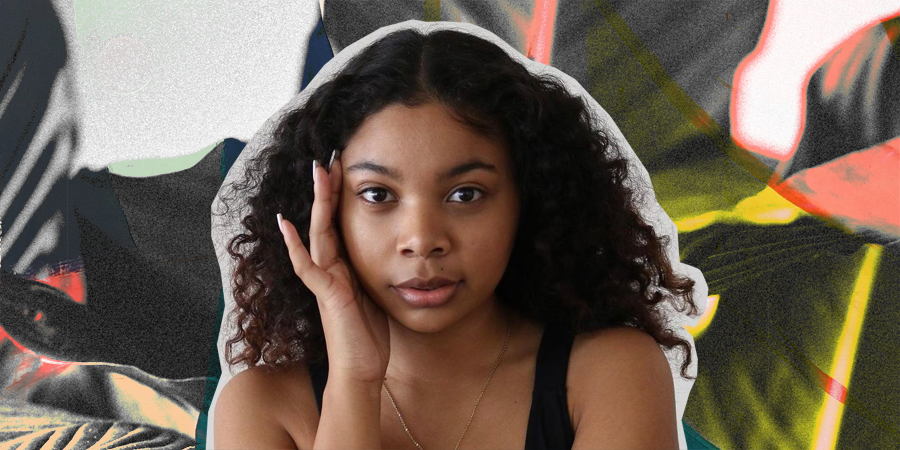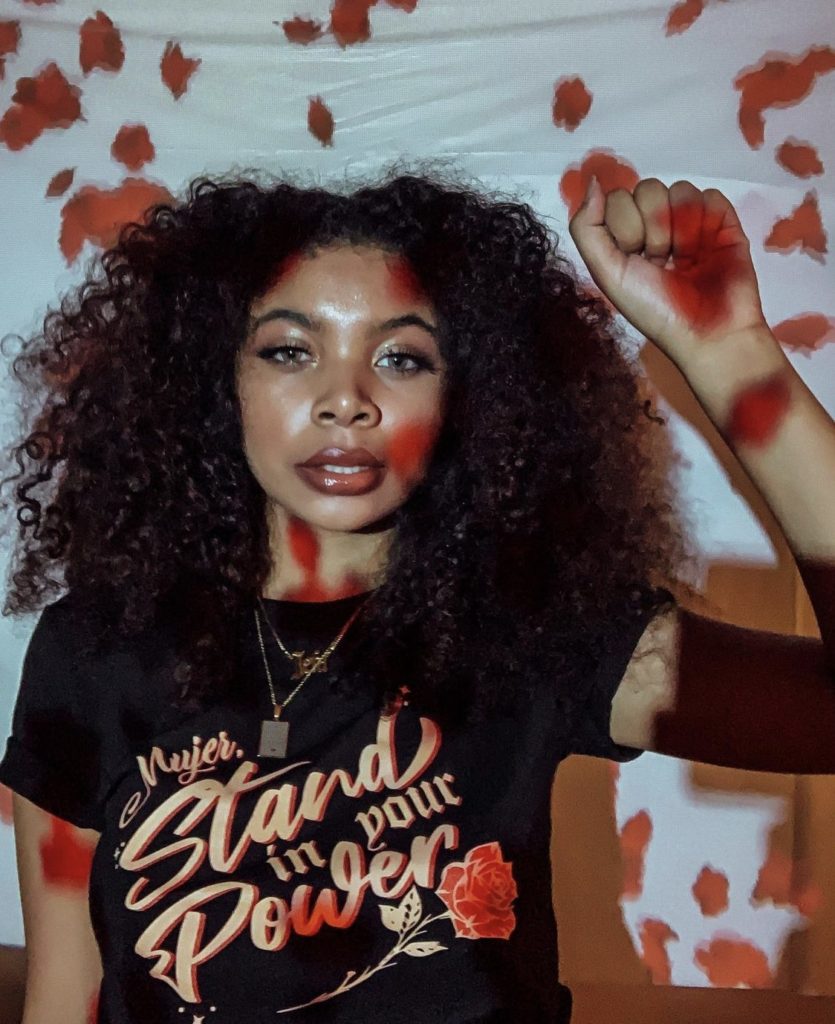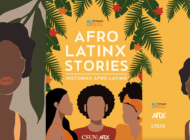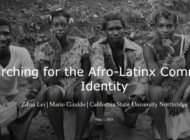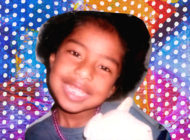In this episode, Tracy Mejía talks to Millie del Oro, who knows that her identity is a mixture of two races and two cultures: Black and Mexican.
By TRACY MEJÍA
EL NUEVO SOL
Tracy Mejía: Welcome to Radio Nepantla, a podcast by El Nuevo Sol, the multimedia site for the Spanish-language journalism program at California State University at Northridge. My name is Tracy Mejía .
The title of this series is Afro-Latinx. We want to tell here diverse stories of Afro-Latinx, Black-Latinx, and Afro-Latin American identity.
According to the Pew Hispanic Center, one out of every four Latinos in the nation identify as Afro-Latinx. This is the same proportion of Afro-Latin Americans in that region.
We decided to use the term Afro-Latinx—with X—to be inclusive of non-binary people. The umbrella term “Black-Latinx” refers to biracial people with one African-American and one Latinx parent. The umbrella term “Afro-Latin American” refers to people of African ancestry in Latin America.
In this episode, I interviewed Millie del Oro, who knows that her identity is a mixture of two races and two cultures.
Millie del Oro: Hi my name is Millie, I’m 24 years old and I currently live in Los Angeles, California. So, as you already know I am Afro-Latina—I am Black and Mexican. So, I know being Afro-Latinx can come with different backgrounds, different mixes or maybe no mixes at all. But for me, I am a mix of two different cultures. So my dad is Black, he was born and raised in Arkansas—so middle of nowhere in the South. And then my mom is Mexican—she was born and raised in Tijuana, Mexico.
Tracy Mejía: Millie’s mother came to the U.S. when she was 20 to attend college.
Millie del Oro: She came to the U.S. when she was about 20, to further pursue her higher education in college. Luckily, growing up, she already learned English. So that is a requirement from where she came from, that really helped her transition into coming to school out here—even though of course it was different.
Tracy Mejía: Millie likes to tell the story of how her mom met her dad and how they got together.
Millie del Oro: She married pretty young—not with my dad. Ever since she first got married she always stayed in the U.S. Years later, two marriages later—and from moving all around the world because her first husband was in the military—comes my father. They met at a Jamaican night kind-of-club in San Diego.
I wouldn’t say they hit it off at first. My dad is Southern. Southern people have this weird thing where they stare at people and they don’t say anything—they are just kind of awkward and make you uncomfortable. So he kind of did that to her—it was very uncomfortable.
She saw this guy staring at her. He never came up to her, he never said anything. Further going on, she would go to parties with her cousin/aunt (they are around the same age)—and she would always see that guy.
So my dad was always at those little parties and little functions. And she was like, “oh, here’s this guy again.” And my aunt would make fun of her like, “oh, there’s your boyfriend.” And she would be like, “shut up, he doesn’t even talk.” But eventually he asked her out and they’ve been dating ever since.
Tracy Mejía: Millie’s parents’ relationship started with some obstacles when it came to the different culture and race between each other’s family. She will explain how each parent had a difficult time being accepted within the family.
Millie de Oro: I feel like their backstory is pretty cool—but I would say it was hard for them. I’m not sure when it was when they started dating or once they got married—just because my dad is Black, my mom is Mexican. They come from two completely different cultures and different countries.
There was a little bit of tension from both sides, from both of the parents. On my mom side, my grandma didn’t feel like my dad was—not saying he wasn’t a good fit cause he was a really good man. He helped my mom take care of her three first children, who weren’t even his kids. But just because of the color of his skin my grandma would say things like, “oh, don’t let him sleep on our pillows because he’ll leave them dirty”—things like that because my dad is like darker skin tone.
So yeah, certain things like that. The invasion of a different culture coming in—things like that.
And from my dad’s side—his mom didn’t feel like my mom was a good fit, just because she wasn’t Southern, you know? Southern people have very small ideals of how people should be—how they should be brought up and my mom was very very young.
She got married at 20 in her first marriage. So she never really got the chance to really be young and live her life even growing up. So her first two years of being a mother, she will still go to the club with her friends. She was in her 20s and hang out and do her thing. She loved dancing so being married never stopped her from doing that.
My dad’s mom really didn’t think that she was a good fit and she was in a different culture so obviously she wasn’t raised to have proper mother ideals, things of that nature.
So, little bit rocky, but it wasn’t too long. I’m probably the reason why they got over that because growing up with both sides, like, there was never any issues (about) my race within my family—which made me really really really happy. Because unfortunately, sometimes people of different cultures make people do get those negative comments from family members or don’t feel as comfortable in their own skin, like in their own homes.
Tracy Mejía: Millie continues the story by explaining how she grew up moving from a big city to a little town and how her being Blaxican affected her living there.
Millie del Oro: So with that being said growing up, I did grow up in the South, so I grew up in Arkansas—in my dad’s hometown and there everyone is either Black or White. There’s no other mixes, there’s no Latin people, no Asian people—nothing outside of Black and White.
My family being so mixed already and also having very strong Latin roots, it was so awkward and weird first moving to the town and seeing how different people are—not only from a diversity standpoint since it wasn’t really that diverse but also just how they’re upbringings are and how little they knew of the outside world.
I would say it was really hard and weird, I talked like this when I first moved out there because we were originally from San Diego. I didn’t have a southern accent, I couldn’t understand them so much and they couldn’t understand me, which surprises me.
Tracy Mejia: Millie states how hard it was when she moved to Arkansas and tried to fit in with the people and she continues to explain it.
Millie del Oro: There were a lot of things I had to learn in order to fit in. People use to say things to me, I went to a predominantly Black school, so my classmates would say things like “do you even speak English? Are you actually Black? You need to pick a side. You don’t really know Spanish.” Basically just saying, talking about how fake the idea between two different cultures was, really trying to make me more Black—I guess you can say.
That was really hard for me because at home I was who I was. I have parents who come from two completely different cultures, but neither one of them tells me, “oh you need to act more like me or you need to change who you are”—none of that kind of stuff. And we bonded with both sides of our families and they would come over and we would go over to their homes; like going to families reunion and things like that. There was never an issue with our races either.
Just going to the outside world, going to school and things like that, and my race being an issue was really weird to me. I honestly didn’t understand it. That was just something I had to learn over time, that someone doesn’t come from a different background then they might not understand and you might have to take a moment to educate them.
Tracy Mejia: In high school, Millie had a roommate who at first wasn’t familiar with someone being mixed and Millie’s mother talked to her roommate.
Millie del Oro: I feel like in high school I had to learn to not take it so personal because it is really just like a learning thing. So for my last two years of high school, 11th and 12th grade, I went to a boarding school and it was still in Arkansas but there was a lot of diversity there. We had a lot of different ethnic groups which made me happy about that, not feeling like i was the only different person in the state of Arkansas other than Black and White.
That was pretty cool but my first year I did have a Black roommate who was from one of those small towns where everyone was either Black or White. So the same thing kind of happened. My middle school experience kind of repeated itself but it was a little bit more intense because we were in high school and you know high schoolers are mean sometimes.
So coming from an all-Black household and also being heavily into religion and being a preacher’s daughter, she had a lot of ideals that were, I won’t say, way different from my upbringing but she didn’t really allow room for different backgrounds and different traditions and different upbringings.
She was one of the people who again would tell me that I need to pick a side, I need to act more Black, I needed to stop trying to speak Spanish because I have relatives who only speaks Spanish so of course I speaking Spanish to them when they call me on the phone, things like that with my grandmother.
That made no sense to me because in my head I’m thinking this is how I’ve always been raised, this is literally what my life has been for all of my existence and I have someone here telling me that i need to change it—doesn’t make any sense.
My mom had a like a sit-down talk with me about it, just letting me know that “hey, she’s never probably interacted with a Latin person,” let alone a mixed person and different upbringings. Her partner might have her a little more centered into their world since they are pretty religious and very ideal in the southern roots. So they don’t have a lot of outside people coming in or traditions. “So, we’re just going to educate her and let her know like, hey they’re a lot of people in the world.”
So my mom also had a talk with her and ever since then things changed, she never tried to tell me to change who I was anymore. She actually tried things from my Latin culture that she really liked. A whole 360 happened. I was mind blown that a conversation can really do that.
Tracy Mejia: It has been a journey for Millie when it comes to her being confident in who she is, and she doesn’t pick sides in which culture she prefers.
Millie del Oro: Definitely has been a learning experience but I say I feel like entering college into now, I’ve been very very confident about who I am, being Afro-Latinx, all the way. I don’t know if anyone has told me since then that I should act more of one side than the other, but if they do I don’t care, cause that doesn’t make any sense.
I don’t like when people question which side I prefer more because I feel like if I pick one over the other, I’m picking one parent over the other—and that’s just not me. I was raised with both parents, so I have a close relationship with both. I’m mixed, I’m proud of it, I’m proud of being Black and Latina, Afro-Latinx and I love teaching people about being different within the same cultures pretty much.
At home, there wasn’t much of like higher culture. I would say food-wise, my mom would do all the cooking so most of the food we ate was either Italian or Mexican. My dad does not know how to cook to save his life, so I didn’t really eat a lot of southern food even though being in the south. So with that aspect, it was more so on my Latin side.
Tracy Mejia: Millie goes on to explain how her mom wanted her and her siblings to be American more than being one of the cultures.
Millie del Oro: My mom didn’t teach us that growing up because she didn’t want us to, I want to say in a sense feel as American as possible and just give us a different experience than she had growing up. So we really were just American kids who happen to be culturally different. There was no like set in stone ways with having to be one way or another at home.
There was a cultural thing that both of my parents taught us but they never pushed us to adapt more of this side or adapt to more of that side.
Tracy Mejia: Millie felt like she was allowed to find herself and wasn’t adapted to be one culture or the other. As you grow you learn more about yourself and your mixed cultures, she continues to say how she feels now.
Millie del Oro: I will say growing up in middle school I did try to fit in more. So I did learn how to use a bonnet and the slang and watching different shows that my classmates would watch and listened to the music they would listen to. I guess that helped me feel stronger in my Black side for one but also just fit-in in general because me being me, a mixed kid from out of town was not helping my situation in fitting in at all.
My parents didn’t raise me to be just one thing, they allowed me to find myself being mixed. They will actually encourage me in being different and it’s okay if you don’t look like one kind or the other.
There’s no rule book on how to be comfortable with yourself, you really have to learn how to do that for yourself and watch videos and follow certain people that look like you. They do help because those were the things I had to do to get where I am today but honestly it does come from within. That power comes from within you and just knowing that you’re perfect the way you are. If you’re different that’s amazing because you have something that no one else has and just share that with the world.
Tracy Mejía: Thanks for listening to Radio Nepantla—La Voz que Traspasa Fronteras. We invite you to listen to the rest of the series Afro-Latinx … We will tell you stories of Afro-Latinx identity.
Listen to our podcast on your favorite platform. You can also check our SoundCloud channel—ElNuevoSol—or our website: ElNuevoSol dot net.
This was a production of El Nuevo Sol—the multimedia project of the Spanish-Language Journalism program at Cal State University, Northridge.
This episode was produced and edited by: Tracy Mejía.
Voice (or voices): Tracy Mejía y Millie del Oro.
Music by the Afro-Colombian group Kombilesa Mi.
See you next time.
Tags: #AFLX Afro-Latinx Blaxican Millie del Oro podcast Radio Nepantla Tracy Mejía






